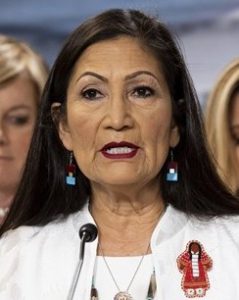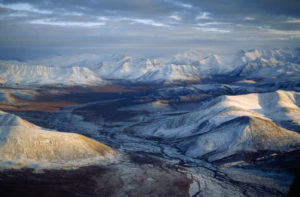 Joe Biden, fresh from his Electoral College victory, and now officially president-elect, named Rep. Deb Haaland (D-NM, photo left) as his choice for Interior, the federal agency that oversees federal lands and Native American affairs.
Joe Biden, fresh from his Electoral College victory, and now officially president-elect, named Rep. Deb Haaland (D-NM, photo left) as his choice for Interior, the federal agency that oversees federal lands and Native American affairs.
Obama’s first interior secretary, Ken Salazar, called her “a terrific choice,” according to NBC News (story here). Rep. Raúl Grijalva, (D-AZ), chair of the House Natural Resources Committee, said Haaland’s appointment would be “substantive” given a history of the agency “that has been anti-Indian in every sense of the word,” NBC News said.
During the so-called “Indian Wars” of the 18th and 19th centuries, U.S. troops fought the tribes to open land to white settlement, and after their defeat, assumed the role of their patrons and protectors, but never elevating their interests above those of the dominant white majority, and the relationship between Native Americans and their usually-white overseers at the Bureau of Indian Affairs — an Interior subagency — has often been fraught. And now, Native American communities are among the hardest-hit by the Covid-19 pandemic (see my previous article here).
The 14th Amendment in 1868 granted universal citizenship, but with the “Indian Wars” still raging, courts ruled it didn’t cover Native Americans. Thus, Native Americans — despite being born and living in the U.S. all their lives — didn’t get U.S. citizenship until a federal law was passed in 1924. Now, almost a century later, Haaland will become the first Native American cabinet official in U.S. history. For this reason, Biden’s selection of her is being called “historic” (see, e.g., The Hill article here).
It will be a startling change for an agency that under Trump has catered to oil and mining interests, and rolled back environmental protections. The outgoing secretary, David Bernhardt, was an industry lawyer and lobbyist when not working at Interior under the G. W. Bush and Trump administrations. He replaced Trump’s original appointee, Ryan Zinke, who was forced out by scandals. Zinke, a one-term GOP congressman from Montana, was profoundly anti-environment.
Biden views Haaland as a piece of a larger environmental agenda that includes other agencies. Upon being picked she said, “As our country faces the impacts of climate change and environmental injustice, the Interior has a role and I will be a partner in addressing these challenges by … moving our country towards a clean energy future.”
The Hill said, “If confirmed by the Senate, Haaland would likely deliver a significant turnaround for an agency that has rolled back environmental and endangered species protections and expanded oil and gas drilling. Biden has pledged to bar any new oil and gas leasing on public lands — an effort likely to require action from Interior. … Haaland was an early backer of the Green New Deal, opposes fracking, and has pushed back against the Trump administration’s shrinking of monuments like Bears Ear and Grand Staircase Escalante,” adding environmental groups “praised the choice” because Haaland would “steadily reverse” Trump-era actions to expand development of public lands.
The editor of this blog recognizes the need for a thriving economy and jobs, but believes we can have a robust economy and a healthy environment at the same time. In reality, the long-term economy depends on sustainable practices. I remember the intense logging of Washington State in the 1970s, when trees were being cut five times faster than they were being replaced; it’s simple math that you can have a lot of jobs for a short time, or harvest at a sustainable rate and have fewer jobs but have them forever.
The same applies to fisheries and other renewable resources. It makes no sense to risk the world’s most productive salmon fishery to extract ore that can be found elsewhere. Permitting for the Pebble Mine, although it hit a snag in November 2020, had been moving forward under the Trump administration, which also took another run at opening the Arctic National Wildlife Refuge (ANWR, photo below) to oild drilling. With world oil markets glutted by oversupply, preserving the arctic’s largest contiguous caribou breeding ground, and home to many other species of wildlife, deserves much higher priority than developing new oil sources.
Considering the larger, planetary, scale of environmental exploitation and despoliation, it must be said that animals who foul their nests are fast-tracking for extinction; and no species fouls its habitat as humans do, which makes us either the dumbest or most suicidal of all species.
Republican environmental policies, which at their worst are servile to short-term profits, and are sold to the public using “jobs” mantras, are neither respectful of the land nor sustainable. Trump’s defeat and the advent of a more environmentally conscious administration, with Deb Haaland heading one of its two key environmental agencies (EPA being the other), gives our nest a second chance. But Trump, who vandalized the environment along with so many other things, is leaving a lot of damage that will take time and work to undo. Haaland will have her job cut out for her.
Haaland’s elevation also will bring new policies, attitudes, and hopefully resources, too, to America’s native communities, which generally speaking are our nation’s most impoverished and neglected communities. Hopefully this marks a serious beginning of the end to that neglect.
